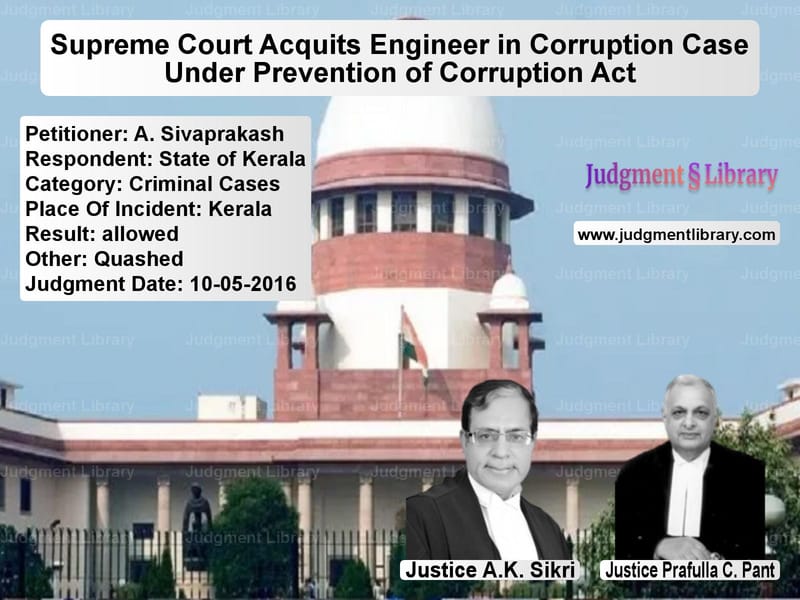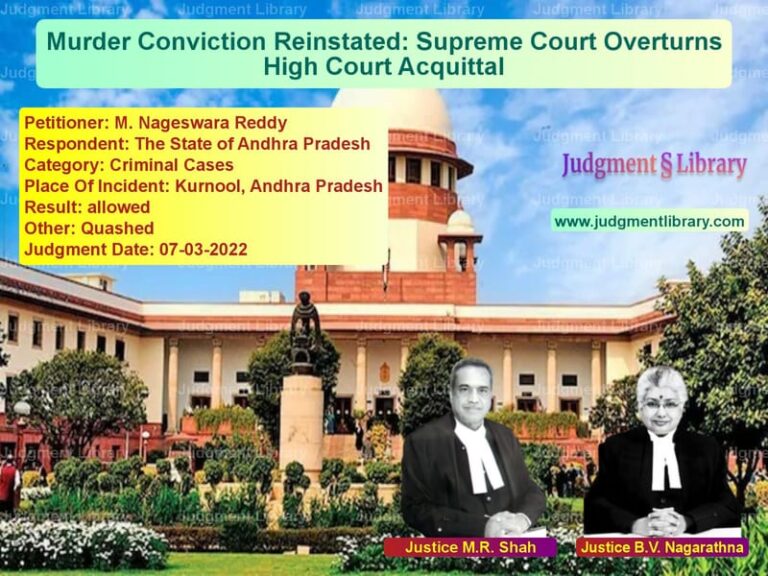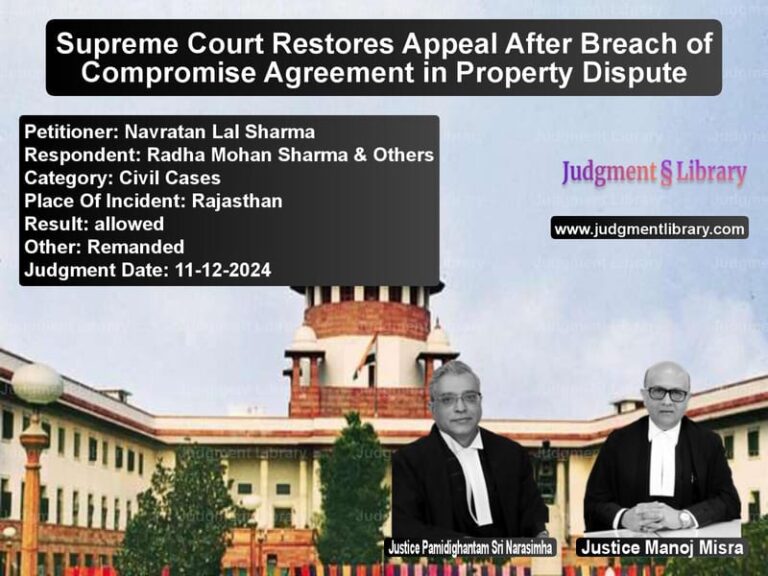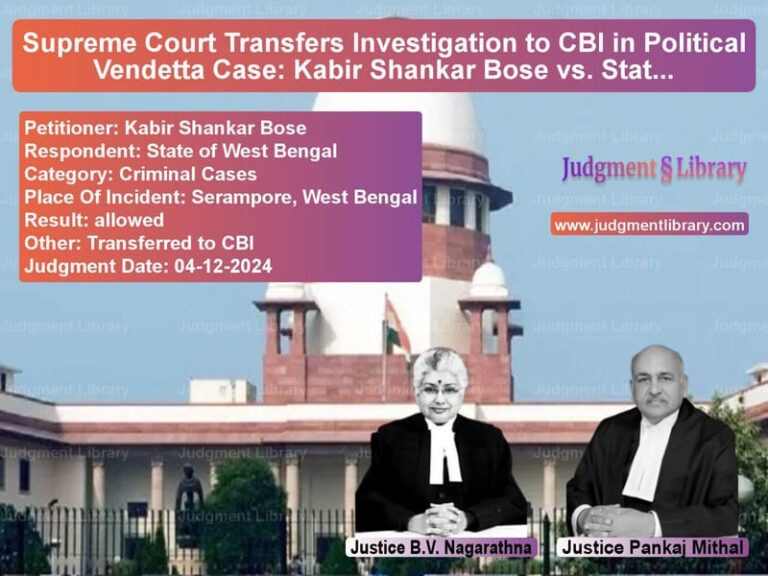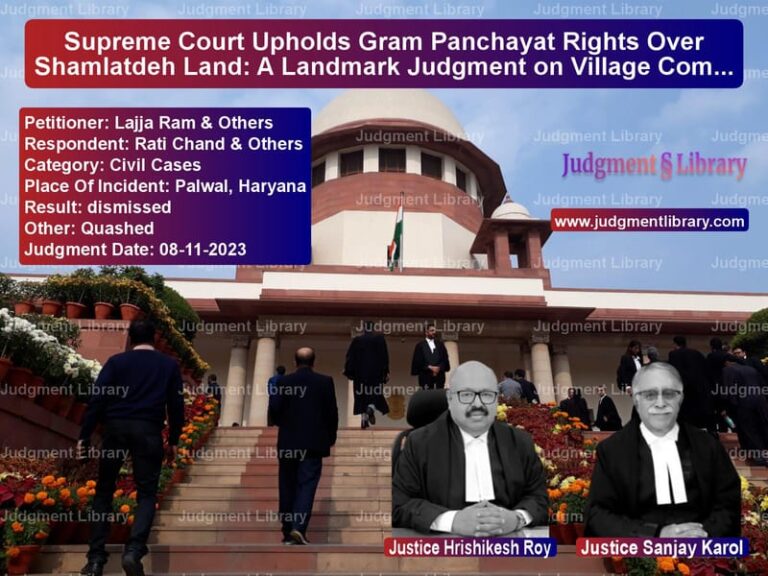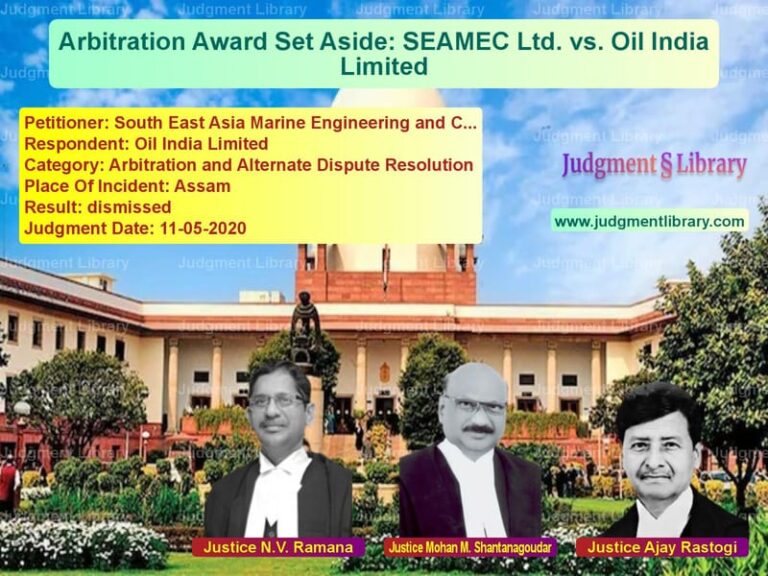Supreme Court Acquits Engineer in Corruption Case Under Prevention of Corruption Act
The case of A. Sivaprakash vs. State of Kerala is a landmark ruling under the Prevention of Corruption Act, 1988, where the Supreme Court of India acquitted an Assistant Engineer accused of issuing false stage certificates for a government-funded construction project. The judgment emphasized the necessity of proving wrongful financial gain beyond reasonable doubt and clarified the distinction between procedural lapses and criminal misconduct.
Background of the Case
The case dates back to September 9, 1993, when an FIR was registered against four individuals under Sections 13(2) read with 13(1)(d) of the Prevention of Corruption Act, 1988, and Section 409 read with Section 34 of the Indian Penal Code (IPC). On January 19, 1998, a charge sheet was filed, including A. Sivaprakash (the appellant) as the fifth accused. The allegations revolved around the misuse of official position and financial misappropriation through fraudulent certification.
The charges included:
- Section 13(2) read with 13(1)(d) of the Prevention of Corruption Act, 1988.
- Sections 468 (forgery for the purpose of cheating) and 471 (using a forged document) read with Section 34 IPC.
During trial proceedings:
- Two of the accused (A-2 and A-3) were acquitted of all charges.
- The remaining accused (A-1, A-4, and A-5, the appellant) were convicted under the Prevention of Corruption Act.
- All accused were acquitted under Sections 468 and 471 IPC.
Key Legal Issues
- Did the appellant misuse his official position for wrongful financial gain?
- Was there conclusive evidence proving that false stage certificates led to an undue financial disbursement?
- Could procedural irregularities alone constitute criminal misconduct under the Prevention of Corruption Act?
Arguments Presented
Appellant’s (A. Sivaprakash) Argument:
- The prosecution failed to establish a direct link between him and wrongful financial gain.
- The funds in question were sanctioned under Jawahar Rozgar Yojana (JRY) guidelines, allowing advance payments.
- The payments were made through due process, and stage certificates were not the sole basis for disbursement.
- There was no evidence proving fraudulent intent.
Respondent’s (State of Kerala) Argument:
- The appellant, in his capacity as an Assistant Engineer, issued a false stage certificate.
- The false certification led to an unjustified financial disbursement.
- Even if no personal gain was proven, issuing a fraudulent certificate amounted to an abuse of official position.
Supreme Court’s Analysis
The Supreme Court examined the case under the following legal parameters:
- The Prevention of Corruption Act requires proof of undue advantage or wrongful gain.
- The prosecution failed to demonstrate any personal benefit derived by the accused.
- Procedural irregularities, absent criminal intent, do not automatically constitute corruption.
- The financial disbursement under JRY guidelines was not solely dependent on the appellant’s certification.
The Court found that the entire case was based on assumptions rather than substantive evidence and ruled that procedural lapses without mens rea (criminal intent) do not amount to corruption.
Final Verdict
The Supreme Court ruled:
- The appellant was acquitted of all charges.
- The conviction under Section 13(1)(d) of the Prevention of Corruption Act was set aside.
- The judgments of the trial court and High Court were overturned due to lack of conclusive evidence.
- The appellant’s bail bonds were discharged.
Key Takeaways
- Burden of Proof in Corruption Cases: The prosecution must establish a direct connection between the accused and wrongful financial gain.
- Distinction Between Procedural Violations and Criminal Offense: Administrative lapses do not necessarily constitute corruption.
- Judicial Scrutiny in Anti-Corruption Laws: Courts require substantive proof before convicting public officials under the Prevention of Corruption Act.
- Importance of Due Process: The ruling underscores the necessity of fair trials and substantial evidence before declaring guilt in corruption cases.
This judgment serves as a vital precedent in corruption-related cases, ensuring that criminal liability is not imposed in the absence of clear and direct evidence of misconduct.
Don’t miss out on the full details! Download the complete judgment in PDF format below and gain valuable insights instantly!
Download Judgment: A. Sivaprakash vs State of Kerala Supreme Court of India Judgment Dated 10-05-2016-1741860758204.pdf
Direct Downlaod Judgment: Direct downlaod this Judgment
See all petitions in Fraud and Forgery
See all petitions in Money Laundering Cases
See all petitions in Judgment by A.K. Sikri
See all petitions in Judgment by Prafulla C. Pant
See all petitions in allowed
See all petitions in Quashed
See all petitions in supreme court of India judgments May 2016
See all petitions in 2016 judgments
See all posts in Criminal Cases Category
See all allowed petitions in Criminal Cases Category
See all Dismissed petitions in Criminal Cases Category
See all partially allowed petitions in Criminal Cases Category

